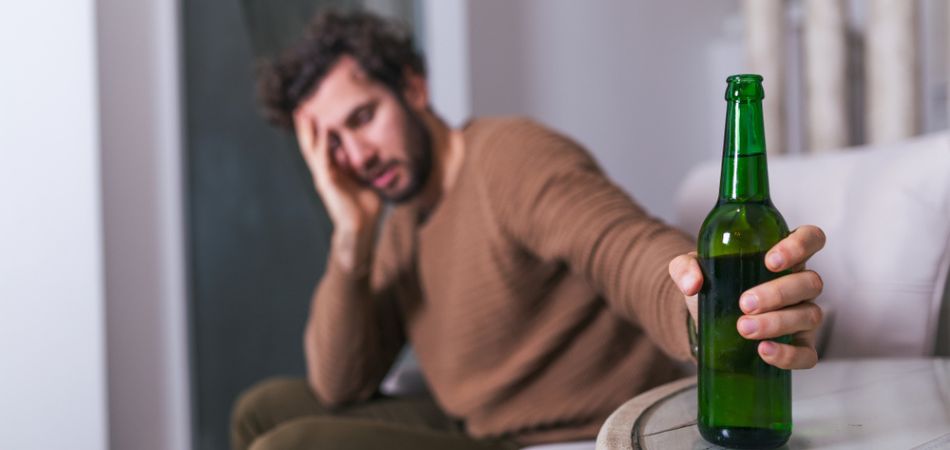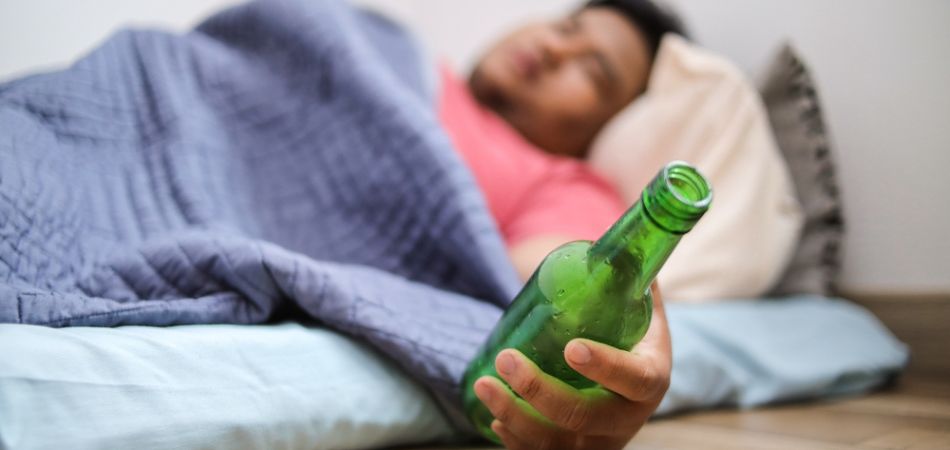Last Updated:
August 21st, 2025
When it comes to recognising physical signs of alcoholism in a loved one, or oneself, some indicators are more overt than others. Some key indicators can be seen in a person’s face, though most of us may overlook the severity of the sign.
This article shines a light on facial indicators that a person is struggling in a battle with alcoholism. We’ll look at what specifically causes these signs and what a person can do to combat issues before they deepen.

Where can we find the line between alcohol use and alcoholism?
Alcoholism, often clinically referred to as an alcohol use disorder (AUD), has dire consequences for a person’s long-term health. AUD is defined by the National Institute on Alcohol Abuse and Alcoholism (NIAAA) as the inability to stop drinking, despite the harmful consequences, including physical, mental, or social effects.
Many people who enjoy occasionally drinking are not completely certain when their drinking is teetering on the edge of an AUD. Most of us will enjoy a few drinks for an occasion like a birthday or holiday, or use drinking as a way to unwind after a stressful day.
However, an alcohol dependency can start to form in subtle ways, often without the person being cognisant of its development.
Some warning signs to watch out for include:
- Drinking alone or in secret, or downplaying the quantity
- Feeling like alcohol is your only way to relax or feel “normal”
- Failed previous attempts to quit
- Continuing to drink despite noticing health problems or relationship strains
Among the myriad of physical and behavioural indicators of alcoholism, signs may start to show in a person’s face, which indicate a worsening condition.
Facial signs that signify alcoholism
Alcohol is known to damage almost every organ in the human body. If you think of an alcoholic person, you can imagine that they often feel guilty or ashamed of their drinking, and so signs that show on the body are often covered up by clothing or make-up. However, when signs start to show on a person’s face, the problem is harder to hide.
A physical sign doesn’t always indicate alcoholism on its own, but if you notice signs along with compulsive behaviour around drinking, you might grow more certain that a problem is deepening. These include:
What causes these signs of alcoholism in the face?
The effects of long-term alcohol abuse on the body are far-reaching. The most common causes of facial signs in an alcoholic include:
- Nutritional deficiencies: Prolonged alcohol consumption will cause your body to struggle with absorbing essential vitamins and minerals. These include vitamins A and C, and zinc, all of which are critical for collagen production in healthy skin.
- Extended dehydration: Most people understand that a hangover involves a headache, as the body is more dehydrated. Prolonged periods where you aren’t getting enough water will lead to multiple facial indicators of alcoholism.
- Liver strain: There is often a direct correlation between a person’s increased drinking and worsening liver function. This is because the liver is primarily responsible for processing the toxic chemicals in alcohol and long-term drinking will overwhelm it. This often leads to high levels of bilirubin in the blood.
- Inflammation: Many people with a long-term alcohol addiction will notice their blood “thinning.” A small cut on the surface of the skin can lead to profuse bleeding. This happens as blood vessels throughout the body dilate and swell when coping with alcohol’s effects.
- Prolonged sleep disturbances: One of the most detrimental effects of long-term alcoholism is how it plagues a person’s ability to get sound sleep. While for some, having a drink may cause the onset of sleep to hasten, the actual quality of sleep is lessened, which inevitably impairs energy levels in the day.
What can I do to help the facial signs of alcoholism?
If you are starting to notice facial signs of alcoholism in yourself or a loved one, you may be understandably worried. Some of the signs we’ve mentioned may only be related to the natural ageing process, like developing wrinkles or dry skin, but if you’re drinking in excess, do not rule out the possibility that it is drinking causing the problems.
With the right lifestyle changes, you may be able to alleviate or even reverse some of these signs, including:
- Cut back or cease drinking: Stopping drinking will always be the best way to reverse alcohol’s effects. Even cutting drinking in half can result in marked positive changes in your skin’s appearance.
- Develop healthier eating and drinking routines: Dehydration is a major contributor to facial alcoholism signs. Ensure you’re drinking enough water to combat dehydration. In addition, a healthier diet will help. Choose foods high in antioxidants, like grains and berries, to support skin repair.
- Take exercise seriously: Healthcare professionals will always advise you to do some exercise, within your capabilities. Do not push yourself beyond your means, but make sure there is enough exercise in your routine to improve blood circulation, in turn helping the development of healthier skin and sleep hygiene.
- Talk to a professional: Lastly, facial signs of alcoholism may be a clear indicator that health problems are deepening, so it may be time to consider reaching out for professional support. A professional can analyse essential functions in the body, like liver health, and let you know if there are problems that need urgent attention. Reaching out before a problem becomes unmanageable may be a life-saving decision, and finding alcohol-related symptoms early is essential to full recovery.
Where can I get support with alcoholism in my life?
If you’ve started noticing these physical changes, whether in your own reflection or a loved one’s, it might be a sign that alcohol is doing more damage than you realised. These aren’t just cosmetic concerns; they’re often warnings that the body and mind are under strain.
At Oasis Runcorn, we’re here to help you take back control and lead a healthier life. Our rehab clinic specialises in medical detox tailored to your needs. Our expert-trained staff helps you manage uncomfortable withdrawal symptoms. We then use evidence-based therapy to get to the root cause of addiction and help you reframe behaviours to manage cravings and urges to relapse.
Don’t wait until a problem worsens. Take the first step towards a brighter, sober tomorrow by reaching out to us today. We’re ready to help you develop the sober life you truly desire and deserve.
(Click here to see works cited)
- “Understanding Alcohol Use Disorder.” National Institute on Alcohol Abuse and Alcoholism, U.S. Department of Health and Human Services, www.niaaa.nih.gov/publications/brochures-and-fact-sheets/understanding-alcohol-use-disorder
- “Alcohol and You: An Interactive Body (Text).” Alcohol and You: An Interactive Body (Text) | College Drinking, Changing the Culture, www.collegedrinkingprevention.gov/special-features/interactive-body/alcohol-and-you-interactive-body-text
- Care, Leightons Opticians & Hearing. “Puffy Eyes.” Leightons Opticians & Hearing Care, 2 Sept. 2024, www.leightons.co.uk/blog/eye-care/puffy-eyes.
- Cherney, Kristeen. “Broken Blood Vessels on Face: Causes, Treatment, and More.” Healthline, Healthline Media, 13 Apr. 2023, www.healthline.com/health/broken-blood-vessels-on-face.
- Rossiaky, David. “High Bilirubin Levels: Symptoms, Causes, and Treatment.” Healthline, Healthline Media, 17 Dec. 2024, www.healthline.com/health/high-bilirubin.


